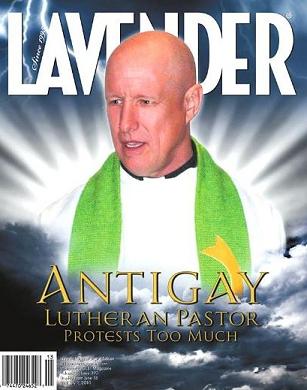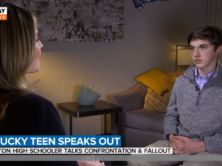
Minnesota magazine Lavender's cover story on Rev. Tom Brock featured information from a confidential 12-step program meeting. (Credit: Lavender)
LGBT magazine Lavender may have gotten a lot of press by exposing a Minnesota reverend’s participation at a meeting for people “struggling with same-sex attraction” in its cover story, but did it violate media ethics guidelines?
The magazine just published in its current issue a lengthy article by John Townsend, which detailed Rev. Tom Brock’s participation in a confidential 12-step therapy meeting and outing Reverend Brock. The Associated Press reports that Brock “regularly broadcasts conservative views on homosexuality and criticizes the Evangelical Lutheran Church in America for liberalizing its gay clergy policy,” and that he tells of his struggles with homosexuality in the meeting.
Townsend reported from the Faith in Action meeting Brock attended. As Townsend reported, Faith in Action is part of the Catholic group Courage, whose Web site says it “ministers to those with same-sex attractions and their loved ones.” Courage uses a 12-step therapy program that its Web site identifies as being based on the12-step program for Alcoholics Anonymous.
The AP reports that Lavender‘s president, Stephen Rocheford, said the magazine doesn’t “out” people unless their private and public lives contradict. However, the AP reports that the executive pastor at Brock’s Hope Lutheran church, Rev. Tom Parrish, said Brock went to meetings for the purpose of “being held accountable.” Also important to note is that Lavender didn’t prove that Brock never said he was gay – just that he “fell into temptation.”
But, did Lavender have a right to report undercover from a confidential meeting?
Townsend reveals in the article himself that the meeting he attended and quoted from was confidential.
He also wrote that he met with the group’s administrator Rev. James Livingston. The AP reported that Livingston said Townsend used a fake name and went to meetings over a period of two months.
David Brauer also blogged on MinnPost.com June 22 that Livingston said Townsend “had a conversation about the importance of confidentiality” and “shook on it” in confirmation of his agreement with the terms.
The AP reported that Poynter’s ethics expert Kelly McBride said the undercover investigation was “troubling.”
The Society of Professional Journalists’ code of ethics advises to “avoid undercover or other surreptitious methods of gathering information except when traditional open methods will not yield information vital to the public. Use of such methods should be explained as part of the story.”
“It’s kind of like being a spy,” the AP reported McBride said. “For most groups that deal with something where members of the group find it shameful, there’s a strong presumption of confidentiality.”
iMediaEthics wrote to Jane Kirtley, the Silha professor for media ethics and law at the University of Minnesota’s journalism school, for her thoughts. She referred us to her statement in Minnesota’s Star-Tribune, where she said that she is “a believer that the use of undercover reporting should be reserved only for the most important stories that you can’t get any other way.”
“Whenever you go undercover, you raise the question with the public: If you were prepared to misrepresent yourself to get the story, how can we be sure that the story is accurate?” she said.
Likewise, Gawker wrote June 23 that 12-step meetings “don’t work if the participants think that a reporter could spill their secrets. And since these meetings save lives, their anonymity should be honored by the press.”
Gawker wrote that while Brock might be the “shamed” by the story, it’s really the magazine’s embarrassment.
Tony Jones wrote on MinnPost.com June 24 wondering if Lavender owes Brock an apology. Jones wrote that “sneaking into a confidential support group is way over the line.”
Jones noted a couple of errors, including calling Brock an “associate pastor.” Brock is a senior pastor.
iMediaEthics has written to Courage, the 12-step program and the Minnesota board for marriage and family therapy about the matter and will post any response.







Comments Terms and Conditions